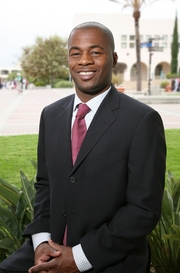Tackling Educational Barriers for Black Men
SDSU Professor Frank Harris III co-authored the report "A Role for Policymakers in Improving the Status of Black Male Students in U.S. Higher Education."

A new report urges federal and state policymakers to take a more active role in efforts focused on improving college and university outcomes for black men.

Co-authored by Frank Harris III, SDSU College of Education professor and co-director of the SDSU's Minority Male Community College Collaborative, the report titled, "A Role for Policymakers in Improving the Status of Black Male Students in U.S. Higher Education," says the participation from a variety of stakeholder groups — including colleges and universities — is necessary to improve black men’s college readiness, postsecondary educational outcomes and degree attainment rates.
While providing a summary of policy-relevant trends and issues concerning black male college students, the report highlights collaborative-based initiatives that postsecondary institutions across the country have implemented in recent years.
Efforts include engaging on-campus and off-campus stakeholder groups, creating credit-bearing courses and partnering with research centers and institutes.
Policy intervention suggestions
The publication also recommends establishing policy interventions that are complementary to current promising practices.
- Funding Interventions: Focus new and existing funding on efforts that target black men, specifically in the areas of college preparation, financial aid and incarceration educational efforts.
- Data, Assessment and Information Sharing Interventions: Use rigorous data to assess and scale initiatives focused on college completion, including state-funded initiatives, educational consortia and applicable research studies and projects.
- Other Important Interventions: Challenge and rethink how relevant groups such as the National Collegiate Athletic Association — the policymaking organization for intercollegiate athletics — and other influential organizations affect the college outcomes of black men.
The study is the second in a publication series focusing on “men of color” in higher education. The first report, Ensuring the Academic Success of Latino Males in Higher Education, introduced a “Blueprint for Action” to provide model program examples and action steps to best support Latino males to and through college and into the workforce.
The Institute for Higher Education
The report was published In conjunction with the Institute for Higher Education Policy and the University of Pennsylvania’s Center for the Study of Race and Equity in Education and co-written with Shaun R. Harper, associate professor in the Graduate School of Education and director of the Center for the Study of Race and Equity in Education at the University of Pennsylvania.
More information
For more information or to download a free copy of A Role for Policymakers in Improving the Status of Black Male Students in U.S. Higher Education, visit the institute's website.



